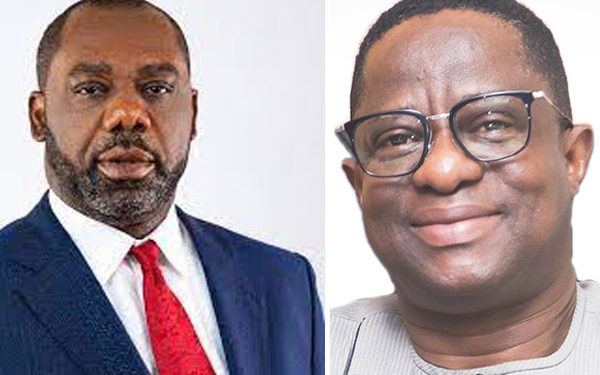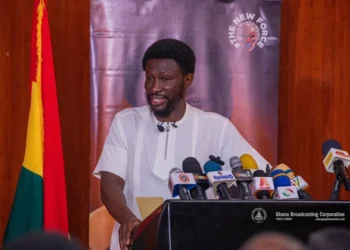The Herald’s investigation into the US$2 billion unconscionable gas deal between a Ghanaian-owned company; Genser and the state-owned Ghana National Petroleum Company (GNPC) and Ministry of Energy, points to a grand conspiracy to share the loot with the company owned by the President’s nephews, who are deeply involved in the grab.
Bright Simons of IMANI-Africa, describes it as “a sweetheart deal” which GNPC buying that gas at US$7.9/ mmbtu and sell to Genser owned by a top financier of the governing New Patriotic Party (NPP) at US$2.79/ mmbtu.
Interestingly, the loss deliberately created to be incurred by the state, is eventually being passed onto Ghanaians as tax paid through electricity consumption.
“If you thought that it’s only Napo – Mathew Opoku-Prempeh, John Peter Amewu and KK Sarpong, who are actors of this transaction, think again”, according to a source close to the transaction.
RelatedPosts
The source, further narrates many beneficiaries working in the Ministry of Energy, Finance Ministry, Energy Commission and at the Presidency, Jubilee House.
Earlier engagement with civil society actors, pointed to some hope that the President, Nana Akufo-Addo, would act to prevent the transaction from proceeding.
It, however, turned out that the entire Akufo Addo family, is plugged in the deal at sophisticated levels with the president’s conscious approval.
A company owned by cousins and nephews of the president, West Coast Ghana Gas, has operated as a gas nomination company for GNPC since 2018. Hitherto before the entry of the company, GNPC performed this role without problems with a limited staff of about 250.
After recruiting so many ruling party elements into the Corporation, with current staff strength of about 800, GNPC handed a more straightforward job of Gas nominations to the West Coast Ghana Gas, linked to the President’s Family. Initially, GNPC was paying US$5 million a year for the assignment.
The current CEO, Opoku Ahweneeh-Danquah, who is a family member, has increased the charge to US$12 million a year.
In the ongoing investigation, The Herald finds shockingly that GNPC, has converted the fixed rate to a charge of thirteen cents on every MMBTU of gas sold.
As a result, the president’s family business, will make about US$400 million in the next 16years from the gas controlled by GNPC.
In the view of people close to the transaction, the amount of money to be made by the family of the president, introduces a high probability that the transaction will succeed.
“There is also so much money to go around, to the media, Parliament and civil society to quiet any discussion on the matter.
However, the opposition in parliament has given a clear indication that they will resist the deal. It remains to be seen, how they will defend Ghana in this situation.
“Public announcements have become the strategy of some of our members in Parliament, but we have credible MPs who may want to truly stand for Ghana in times like this”, according to a leading member of the NDC.
The Herald will continue to monitor the space and inform the public on all the beneficiaries of the transaction.
Meanwhile, John Abdulai Jinapor, the Member of Parliament (MP) for Yapei Kusawgu Constituency, in the Savanna Region in a Radio Gold interview last Friday, waded into the Genser deal, saying that Parliament will delve into the matter tomorrow, Tuesday, September 27, 2022 at a meeting with the Ghana Gas and GNPC.
He questioned why Genser will be buying the gas at US$2.79/ mmbtu, while Volta River Authority will be paying at US$7.9/ mmbtu, saying there’s too much political interference, corruption and mismanagement within the Energy sector.
He insisted that, the Akufo-Addo government and its apparatchiks and their cohorts, see the sector as a place to make free money.
He said the Genser agreement by the government has “dislodged” the VRA as a cash cow due to the huge dollars it makes from supplying power to mining companies, adding 100 megawatts of power owned by VRA is lying idle and making the authority unproductive.
He blamed GNPC and Ghana Gas, over the Genser deal.
He also warned that Parliament will not countenance an attempt by the Finance Minister, Ken Ofori-Atta, to secure some US$500 million with Ghana’s oil, insisting that attempts to compromise some MPs will not work.
This paper’s previous publication had said that GNPC, was aware of the economic malaise the country faces, much of which is attributable to the dysfunctional set up and actions of the Corporation.
Two weeks ago, the Italian Giant, Eni, had to draw down Ghana’s LC with Stanchart, because GNPC, was unable to pay for the OCTP gas. An amount of US$183 million was drawn at one go, creating a total outstanding debt of US$360 million with Stanchart.
The LC draw downs, have become recurrent since 2018, with GNPC clueless about how to redeem the crisis to stabilize the finances of the corporation and be responsible for its debt.
The worst that can happen from any prudent analysis is for GNPC to sell the expensive gas at a discount. But perhaps it makes sense for private benefit, hence undermining public good on the altar of greed to discount the gas for a private company.
In all of this, the taxes of the people are used to offset the discount given by GNPC. Unfortunately, it appears GNPC is not alone in this game. The Economic Management Team (EMT) has systematically laid the foundation for such a nation wrecking decision. The EMT, in cahoots with the Ministry of Energy, assumed regulatory function to undermine the decisions of the Energy commission to sell gas at commingled price to provide fairness in the gas market.
Therefore, the ruling of the Energy Commission to deny Genser cheap gas was thrown to the dogs by successive energy ministers, and ever-present Dr Kofi Koduah Sarpong, who as GNPC boss, approved a gas sale of US$2.79/ mmbtu when John Peter Amewu was Energy Minister, and a further discount of US$1.79 under Matthew Opoku Prempeh alias “Napo” to create an all-in-Cost of about US$2 billion in sixteen years.
To the fair mind, this raises questions about whether it is just a matter of incompetence or negligence. But, the complete alignment of energy ministers and CEOs to such blatant commitment of a public agency to such a “financial menstruation” affirms incontrovertible negligence on the part of officialdom.
In the coming days, The Herald, will be providing systematic insight into the politics, the private gains and the cast of actors working to make Ghana poorer, while they enjoy lavish lives with their families.










Discussion about this post